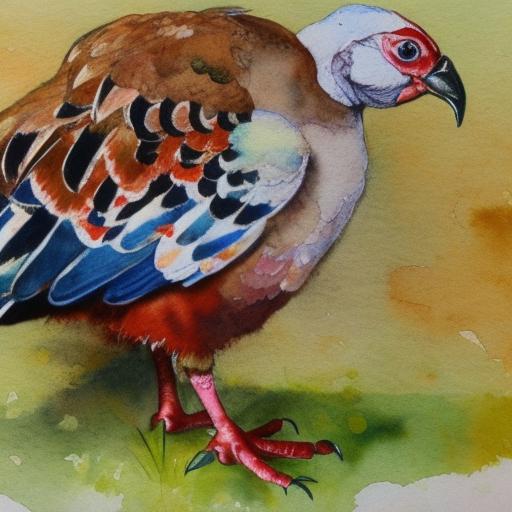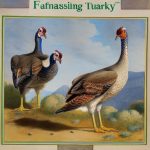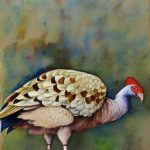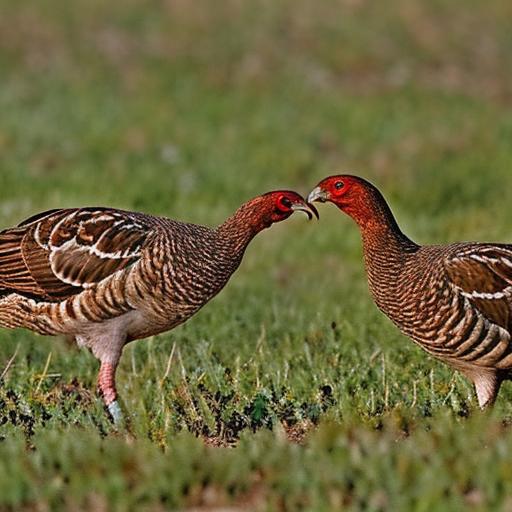Turkey breeds come in a variety of sizes, colors, and temperaments, each with its own unique characteristics and traits. Understanding the different breeds is essential for anyone looking to mix turkey breeds in their flock. Broad Breasted Whites are the most common commercial breed, known for their large size and fast growth rate. They are typically raised for meat production and are not as agile as other breeds. Narragansett turkeys are known for their calm and friendly demeanor, making them a popular choice for backyard flocks. They have a beautiful color pattern and are good for both meat and egg production. Bourbon Red turkeys are another popular breed known for their excellent foraging abilities and flavorful meat. They are also known for their calm temperament, making them a great addition to a mixed flock. Understanding the unique characteristics of each breed is important when considering mixing turkey breeds in order to create a balanced and harmonious flock.
When it comes to understanding turkey breeds, it’s important to consider the specific needs and requirements of each breed. For example, some breeds may require more space to roam and forage, while others may be more prone to certain health issues. Additionally, some breeds may be more aggressive or dominant, while others may be more docile and submissive. Understanding these differences is crucial when mixing turkey breeds to ensure that they can coexist peacefully and thrive in a mixed flock. It’s also important to consider the purpose of mixing turkey breeds, whether it’s for meat production, egg production, or simply for the enjoyment of having a diverse flock. By understanding the unique characteristics and requirements of each breed, you can make informed decisions when mixing turkey breeds in your flock.
Key Takeaways
- Understanding Turkey Breeds:
- There are several turkey breeds, each with unique characteristics and traits.
- Breeds like Broad Breasted White, Bourbon Red, and Narragansett are popular for meat production.
- Heritage breeds like Royal Palm and Midget White are known for their unique appearances and good foragers.
- Benefits of Mixing Turkey Breeds:
- Mixing turkey breeds can lead to hybrid vigor, resulting in healthier and more resilient birds.
- It can also create a more diverse flock with a variety of colors, sizes, and personalities.
- Different breeds may have varying strengths, such as one being better at foraging while another is more disease-resistant.
- Considerations When Mixing Turkey Breeds:
- Consider the space and resources needed for different breeds, as some may require more room or specific environmental conditions.
- Breeds with different growth rates may require separate feeding and management strategies.
- Be mindful of potential aggression or mating issues when mixing different turkey breeds.
- Popular Turkey Breeds for Mixing:
- Broad Breasted White and Bourbon Red are popular for meat production and can be crossed for hybrid vigor.
- Heritage breeds like Narragansett and Royal Palm are known for their unique appearances and can add diversity to a mixed flock.
- Midget White turkeys are good foragers and can contribute to a mixed flock’s self-sufficiency.
- Managing a Mixed Turkey Flock:
- Provide adequate space and resources to accommodate the needs of different breeds.
- Monitor the flock for any signs of aggression or bullying, and be prepared to separate birds if necessary.
- Tailor feeding and management practices to suit the specific requirements of each breed in the mixed flock.
- Challenges of Mixing Turkey Breeds:
- Different growth rates and sizes may lead to competition for resources within the flock.
- Breeds with distinct personalities and behaviors may require careful management to prevent conflicts.
- Maintaining breed purity can be a challenge when mixing turkey breeds, especially for heritage breeds.
- Conclusion: Is Mixing Turkey Breeds Right for You?
- Mixing turkey breeds can offer benefits such as hybrid vigor and a diverse flock, but it also comes with challenges that require careful management.
- Consider your resources, space, and management capabilities before deciding to mix turkey breeds.
- Ultimately, the decision to mix turkey breeds should align with your goals and capabilities as a turkey farmer.
Benefits of Mixing Turkey Breeds
There are several benefits to mixing turkey breeds in a flock. One of the main benefits is genetic diversity, which can lead to healthier and more resilient birds. By mixing different breeds, you can reduce the risk of inbreeding and genetic disorders, leading to a stronger and more robust flock. Additionally, mixing turkey breeds can also lead to a more visually appealing flock, with a variety of colors and patterns adding interest to your farm or backyard. This can be especially appealing for those who enjoy the aesthetic aspect of raising turkeys. Another benefit of mixing turkey breeds is the potential for improved productivity. By selecting breeds with complementary traits, such as good foraging abilities or high egg production, you can create a more efficient and productive flock. For example, mixing a breed known for its meat production with a breed known for its egg-laying abilities can result in a well-rounded flock that meets both meat and egg production needs.
Another benefit of mixing turkey breeds is the potential for improved temperament and behavior in the flock. By selecting breeds with desirable traits, such as calmness or friendliness, you can create a more harmonious and enjoyable flock to work with. This can be especially important for those who have children or pets on the farm, as well as for those who simply enjoy spending time with their turkeys. Additionally, mixing turkey breeds can also provide a learning opportunity for those interested in poultry genetics and breeding. By observing the traits and behaviors of different breeds within the mixed flock, you can gain valuable insights into the complexities of poultry genetics and breeding. Overall, there are numerous benefits to mixing turkey breeds, from improved genetic diversity and productivity to creating a visually appealing and harmonious flock.
Considerations When Mixing Turkey Breeds
When considering mixing turkey breeds, there are several important factors to take into account. One of the main considerations is space requirements, as different breeds may have varying needs when it comes to roaming and foraging. Some breeds may be more active and require more space to roam, while others may be content with less space. It’s important to assess your available space and ensure that it can accommodate the needs of all the different breeds in your mixed flock. Additionally, it’s important to consider the potential for aggression or dominance within the mixed flock. Some breeds may be more aggressive or dominant than others, which can lead to conflicts and stress within the flock. It’s important to carefully observe the behavior of each breed and intervene if necessary to maintain a peaceful and harmonious flock.
Another consideration when mixing turkey breeds is the potential for crossbreeding. If you’re not careful, different breeds within the mixed flock may interbreed, leading to undesirable traits or genetic disorders. It’s important to carefully manage breeding within the flock to prevent unintended crossbreeding and maintain the integrity of each breed. Additionally, it’s important to consider the specific needs and requirements of each breed when it comes to nutrition and healthcare. Some breeds may have specific dietary needs or be more prone to certain health issues, so it’s important to tailor your management practices accordingly. By taking these considerations into account, you can ensure that your mixed turkey flock remains healthy, harmonious, and productive.
Popular Turkey Breeds for Mixing
There are several popular turkey breeds that are well-suited for mixing in a diverse flock. The Narragansett turkey is a popular choice known for its calm temperament and excellent foraging abilities. They are also good layers, making them a valuable addition to a mixed flock for both meat and egg production. Bourbon Red turkeys are another popular breed known for their friendly demeanor and flavorful meat. They are also excellent foragers and do well in free-range environments, making them a great choice for those looking to mix turkey breeds in a more natural setting. Royal Palm turkeys are another popular breed known for their striking color pattern and friendly disposition. They are good foragers and do well in mixed flocks, adding visual interest and diversity to the flock.
Another popular breed for mixing in a diverse flock is the Broad Breasted Bronze turkey. They are known for their large size and fast growth rate, making them an excellent choice for meat production. Mixing this breed with others known for their egg-laying abilities or calm temperament can result in a well-rounded and productive flock. Additionally, the White Holland turkey is another popular choice known for its large size and excellent meat quality. Mixing this breed with others known for their foraging abilities or friendly demeanor can lead to a diverse and productive flock with a variety of desirable traits. Overall, there are several popular turkey breeds that are well-suited for mixing in a diverse flock, each bringing its own unique characteristics and benefits to the table.
Managing a Mixed Turkey Flock
Managing a mixed turkey flock requires careful observation, attention to detail, and proactive intervention when necessary. One important aspect of managing a mixed flock is monitoring the behavior of each breed within the flock. This includes observing interactions between different breeds, identifying any signs of aggression or dominance, and intervening if necessary to maintain peace and harmony within the flock. It’s also important to provide adequate space and resources to accommodate the needs of all the different breeds within the mixed flock, including nesting areas, roosting space, and access to food and water.
Another important aspect of managing a mixed turkey flock is implementing a proactive breeding management plan to prevent unintended crossbreeding. This may involve separating different breeds during breeding season or using specific breeding techniques to maintain the integrity of each breed within the mixed flock. Additionally, it’s important to tailor your management practices to meet the specific needs and requirements of each breed within the mixed flock, including nutrition, healthcare, and environmental conditions. By carefully managing your mixed turkey flock, you can ensure that all the different breeds coexist peacefully and thrive in a harmonious and productive environment.
Challenges of Mixing Turkey Breeds

While there are many benefits to mixing turkey breeds in a diverse flock, there are also several challenges that come with this approach. One of the main challenges is managing potential aggression or dominance within the mixed flock. Some breeds may be more aggressive or dominant than others, leading to conflicts and stress within the flock. It’s important to carefully observe the behavior of each breed and intervene if necessary to maintain peace and harmony within the flock. Additionally, there is also the potential for unintended crossbreeding within a mixed flock, which can lead to undesirable traits or genetic disorders. It’s important to implement proactive breeding management practices to prevent unintended crossbreeding and maintain the integrity of each breed within the mixed flock.
Another challenge of mixing turkey breeds is meeting the specific needs and requirements of each breed within the mixed flock. Different breeds may have varying needs when it comes to nutrition, healthcare, space requirements, and environmental conditions. It’s important to tailor your management practices accordingly to ensure that all the different breeds thrive in a harmonious and productive environment. Additionally, there is also the potential for increased complexity in managing a mixed turkey flock compared to a single-breed flock. This may require more time, effort, and resources to effectively manage a diverse range of breeds within the same flock. By being aware of these challenges and implementing proactive management practices, you can successfully overcome these obstacles and create a thriving mixed turkey flock.
Is Mixing Turkey Breeds Right for You?
In conclusion, mixing turkey breeds can offer numerous benefits such as genetic diversity, improved productivity, enhanced temperament and behavior, as well as providing an opportunity for learning about poultry genetics and breeding. However, it’s important to carefully consider various factors such as space requirements, potential aggression or dominance within the flock, risk of unintended crossbreeding, as well as meeting specific needs of each breed within the mixed flock before deciding if mixing turkey breeds is right for you.
If you have the time, resources, and willingness to carefully manage a diverse range of turkey breeds within your flock while being proactive in addressing potential challenges such as aggression or dominance among different breeds as well as preventing unintended crossbreeding through careful breeding management practices then mixing turkey breeds could be an exciting venture that offers numerous rewards such as creating a visually appealing and harmonious flock with improved genetic diversity leading to healthier birds with enhanced productivity.
On the other hand if you prefer simplicity in managing your turkey flock or have limited resources or space available then maintaining a single-breed flock might be more suitable for you at this time.
Ultimately, whether mixing turkey breeds is right for you depends on your specific circumstances, goals, resources available as well as your willingness to invest time and effort into managing a diverse range of turkey breeds within your flock while being proactive in addressing potential challenges that may arise from this approach.
Sure, here’s the paragraph with the related article included as an tag:
When considering mixing turkey breeds, it’s important to understand the potential challenges and benefits. If you’re also interested in raising chickens, you might find it helpful to learn about the ideal coop size for chickens. Poultry Wizard offers a comprehensive guide on how big a coop needs to be for a chicken, which can provide valuable insights into creating a suitable environment for your poultry. Understanding the space requirements for different types of poultry can help you make informed decisions when it comes to mixing turkey breeds and managing your overall flock.
FAQs
What are the different turkey breeds that can be mixed?
There are several different turkey breeds that can be mixed, including the Broad Breasted White, Broad Breasted Bronze, Bourbon Red, Narragansett, and Royal Palm.
Can different turkey breeds be raised together?
Yes, different turkey breeds can be raised together. However, it is important to consider factors such as size, temperament, and compatibility when mixing turkey breeds.
What are the potential benefits of mixing turkey breeds?
Mixing turkey breeds can lead to genetic diversity, which can result in healthier and more resilient turkeys. It can also create unique and visually appealing flocks.
Are there any potential drawbacks to mixing turkey breeds?
One potential drawback of mixing turkey breeds is that it can lead to unpredictable offspring in terms of size, color, and temperament. Additionally, some breeds may be more susceptible to certain diseases or health issues.
How should different turkey breeds be mixed?
When mixing turkey breeds, it is important to introduce them to each other gradually and monitor their interactions. Providing ample space, food, and water can help minimize any potential conflicts.
Meet Walter, the feathered-friend fanatic of Florida! Nestled in the sunshine state, Walter struts through life with his feathered companions, clucking his way to happiness. With a coop that’s fancier than a five-star hotel, he’s the Don Juan of the chicken world. When he’s not teaching his hens to do the cha-cha, you’ll find him in a heated debate with his prized rooster, Sir Clucks-a-Lot. Walter’s poultry passion is no yolk; he’s the sunny-side-up guy you never knew you needed in your flock of friends!







